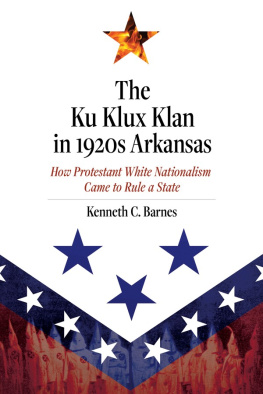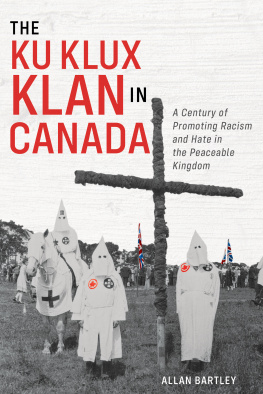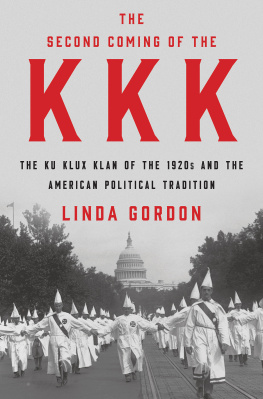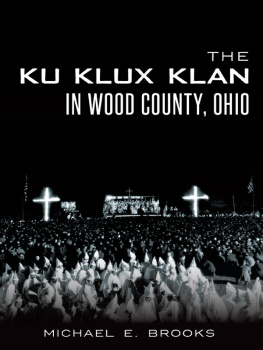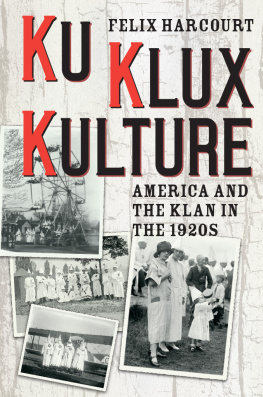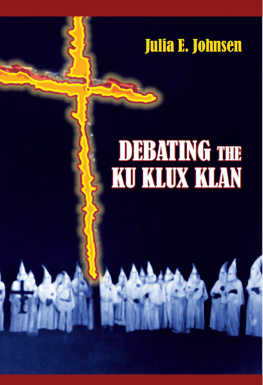Kelly J. Baker - Gospel According to the Klan: The KKKs Appeal to Protestant America, 1915-1930
Here you can read online Kelly J. Baker - Gospel According to the Klan: The KKKs Appeal to Protestant America, 1915-1930 full text of the book (entire story) in english for free. Download pdf and epub, get meaning, cover and reviews about this ebook. publisher: University Press of Kansas, genre: Politics. Description of the work, (preface) as well as reviews are available. Best literature library LitArk.com created for fans of good reading and offers a wide selection of genres:
Romance novel
Science fiction
Adventure
Detective
Science
History
Home and family
Prose
Art
Politics
Computer
Non-fiction
Religion
Business
Children
Humor
Choose a favorite category and find really read worthwhile books. Enjoy immersion in the world of imagination, feel the emotions of the characters or learn something new for yourself, make an fascinating discovery.

- Book:Gospel According to the Klan: The KKKs Appeal to Protestant America, 1915-1930
- Author:
- Publisher:University Press of Kansas
- Genre:
- Rating:5 / 5
- Favourites:Add to favourites
- Your mark:
Gospel According to the Klan: The KKKs Appeal to Protestant America, 1915-1930: summary, description and annotation
We offer to read an annotation, description, summary or preface (depends on what the author of the book "Gospel According to the Klan: The KKKs Appeal to Protestant America, 1915-1930" wrote himself). If you haven't found the necessary information about the book — write in the comments, we will try to find it.
Most studies of the KKK dismiss it as an organization of racists attempting to intimidate minorities and argue that the Klan used religion only as a rhetorical device. Baker contends instead that the KKK based its justifications for hatred on a particular brand of Protestantism that resonated with mainstream Americans, one that employed burning crosses and robes to explicitly exclude Jews and Catholics.
To show how the Klan used religion to further its agenda of hate while appealing to everyday Americans, Kelly Baker takes readers back to its second incarnation in the 1920s. During that decade, the revived Klan hired a public relations firm that suggested it could reach a wider audience by presenting itself as a fraternal Protestant organization that championed white supremacy as opposed to marauders of the night. That campaign was so successful that the Klan established chapters in all forty-eight states.
Baker has scoured official newspapers and magazines issued by the Klan during that era to reveal the inner workings of the order and show how its leadership manipulated religion, nationalism, gender, and race. Through these publications we see a Klan trying to adapt its hate-based positions with the changing times in order to expand its base by reaching beyond a narrowly defined white male Protestant America.
This engrossing expos looks closely at the Klans definition of Protestantism, its belief in a strong relationship between church and state, its notions of masculinity and femininity, and its views on Jews and African Americans. The book also examines in detail the Klans infamous 1924 anti-Catholic riot at Notre Dame University and draws alarming parallels between the Klans message of the 1920s and current posturing by some Tea Party members and their sympathizers.
Analyzing the complex religious arguments the Klan crafted to gain acceptabilityand credibilityamong angry Americans, Baker reveals that the Klan was more successful at crafting this message than has been credited by historians. To tell American history from this startling perspective demonstrates that some citizens still participate in intolerant behavior to protect a fabled white Protestant nation.
Kelly J. Baker: author's other books
Who wrote Gospel According to the Klan: The KKKs Appeal to Protestant America, 1915-1930? Find out the surname, the name of the author of the book and a list of all author's works by series.

